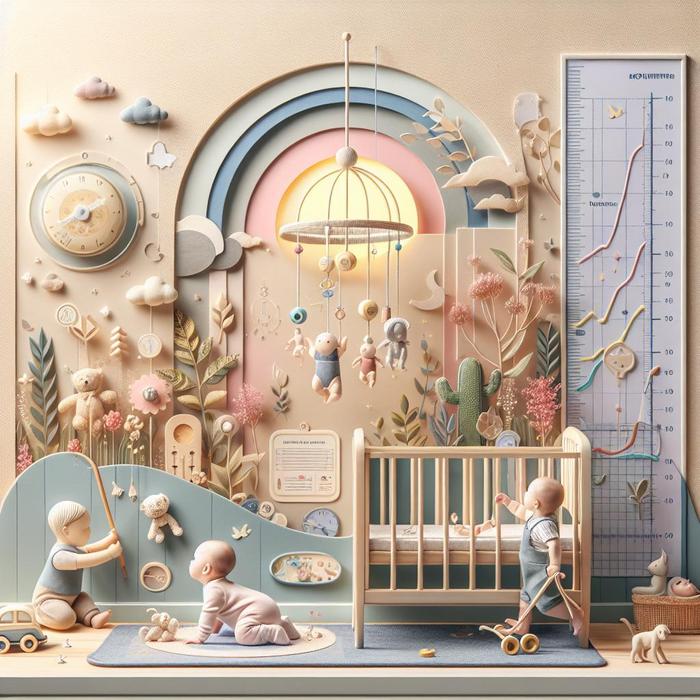Grasping the Pivotal Stages of Baby Growth Milestones
Every parent eagerly anticipates their child’s growth and development. It’s important to keep an eye on your baby’s progress to ensure they are hitting their milestones and thriving. Understanding your baby’s growth milestones can give you the peace of mind that your child is developing as expected, and also help you recognize if they may need additional support
What are Baby Growth Milestones?
Baby growth milestones are key indicators of your child’s development. They are measurable physical and behavioral achievements in your child’s journey from an infant to a toddler, including crawling, walking, and talking. Monitoring these growth milestones is crucial for parents as they can provide early signs of potential developmental delays or health issues.
Keeping Track of Your Child’s Growth
The best way to monitor your child’s growth is to regularly track their milestones. Pay close attention to the typical abilities at certain ages and consider keeping a developmental diary. This could include jotting down when your baby first smiles, sits up, rolls over, or takes their first steps.
Some Key Baby Growth Milestones include:
- First smile: Usually occurs when your baby is around 2 to 3 months old
- Sitting up without support: Typically seen when your baby is about 6 months old
- First steps: Usually happens between 9 to 12 months
- Saying first words: Typically occurs between 12 to 15 months
However, remember that every child is unique and may reach these milestones at their own pace. If you have any concerns about your child’s development, do not hesitate to seek professional advice from a healthcare provider.
Why Nutrition Matters in Baby Growth Milestones
Believe it or not, your baby’s cognitive, physical, and emotional development is significantly influenced by their nutritional intake. A balanced and nutritious diet is essential for your child’s brain development, muscle growth, and overall well-being. You can learn more about what to feed your growing baby on our blog post.
Boost Your Baby’s Cognitive Development
Cognitive development is an important aspect of your child’s overall growth. Engaging your baby in various developmental activities can help stimulate their brain and boost cognition. Check out our previous post for some helpful activities.
Handling Life with a Newborn
While it’s exciting to watch your baby grow and hit their milestones, it can also be overwhelming at times. We have compiled a list of ways to simplify your daily routine with a newborn in our previous post.
Understanding your baby’s growth milestones is a rewarding part of parenthood. Your little one’s smiles, first steps, and babbling are not just adorable – they’re signs of healthy development. Keep in mind that every baby develops at their own pace. The journey may be filled with uncertainty, but understanding what to expect can help ease your concerns and let you fully enjoy this precious time.
How Baby Growth Milestones are Assessed
Healthcare professionals primarily rely on the World Health Organization’s (WHO) child growth standards to assess a child’s development. However, speed of achieving milestones can vary from one child to another and it’s important to remember that a late bloomer isn’t necessarily a cause for alarm. What is considered a ‘norm’ is quite broad and merely serves as a general guide. If there is a delay, it could simply mean your baby needs a little more time.
The Importance of Regular Check Ups
Regular check-ups with your healthcare provider are crucial in keeping track of your child’s development. Pediatricians not only measure height and weight but also assess motor skills, communication, and social behavior. This way, if there is a considerable delay or irregularity in development, early intervention can be made.
Early developmental delays
It can be a source of anxiety if your child isn’t reaching their milestones within the typical timeline. But remember, late development doesn’t always mean something is wrong. However, if you notice a significant delay, it’s crucial to consult with your pediatrician. According to the Center for Disease Control, early intervention is vital for managing developmental delays.
How to Encourage Baby Growth
Support is crucial in aiding your baby’s development. Here are some ways you can encourage baby growth:
- Interactive play: Engaging in age-appropriate play can help refine a baby’s motor skills and cognitive abilities. Toys that stimulate the senses, like rattles, and soft toys of different textures, can boost sensory development.
- Communication: Talking, reading, and singing to your baby can help develop their language skills and encourage them to imitate sounds and gestures.
- Physical activity: Daily tummy time exercises can strengthen your baby’s neck and upper body, which are crucial for reaching milestones like rolling over, crawling, and sitting up.
The Role of Parents in Baby Growth and Development
As a parent, your role in your baby’s growth and development is imperative. You offer comfort, nutrition, and stimulation which are essential for your child’s overall well-being. By observing your child closely and responding to their cues, you aid their emotional development and build trust and security.
Frequently Asked Questions
- When does an infant start to recognize its mother? Around the age of two months, an infant begins to recognize their mother’s face and voice. This is a significant emotional growth milestone in an infant’s life.
- When does a baby start seeing properly? A newborn’s vision is usually blurry. They start to see more clearly around the age of three months and by eight months, a baby’s vision is almost as good as an adult’s.
- When does a baby generally roll over? A baby generally starts rolling over when they are around three to five months old. It’s an essential motor skill milestone that serves as a stepping stone to sitting up and crawling.
- When does a baby start understanding language? At around six months, a baby begins to recognize basic sounds in their language and from nine months, they start understanding basic words like ‘yes’ and ‘no’.
While living this parenting journey can occasionally be overwhelming, it is filled with priceless moments of joy and fulfillment. Watching your child grow, explore, and discover the world around them is undoubtedly one of the most rewarding phases of your life. Wrapping your head around the intricacies of baby growth milestones is beneficial in raising a healthy, happy baby.

